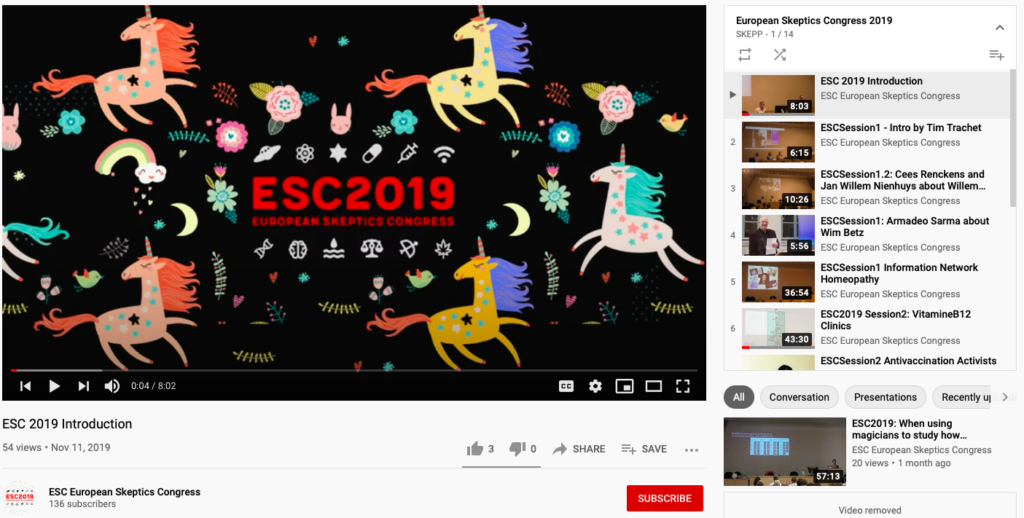A national patient survey conducted by the Human Fertilisation and Embryology Authority (HFEA) on the experiences of 1,500 fertility-treatment patients in the UK has found that three quarters of patients are being offered unnecessary add-on treatments that ‘are not proven to increase the change of having a baby’. In fact, this has been happening for several years now and in 2016 was the subject of both a Panorama undercover investigation on BBC 1 television and a paper published in the online journal BMJ Open.
Keywords: pseudomedicine
Remember the 18th ESC?
 If you want to remind yourself of all the thought-provoking talks and lectures delivered at the 18th ESC, or, if you weren’t there and want to know what was said, here’s your chance!
If you want to remind yourself of all the thought-provoking talks and lectures delivered at the 18th ESC, or, if you weren’t there and want to know what was said, here’s your chance!
The talks are now on YouTube for your viewing enjoyment and education.
Stop Pseudoscience campaign
This Twitter campaign to raise awareness about pseudo therapies has just kicked off for the second consecutive year.
Last year’s campaign got around 2000 reports.
To join the campaign follow the link and click through.
Skepticism Reloaded
Amardeo Sarma
42 years have passed since the birth of CSICOP, the Committee for the Scientific Investigation of Claims of the Paranormal, and its magazine Skeptical Inquirer. Soon after, there was a global wave in the spread of skepticism. A great visionary was at the centre of the explosion: Paul Kurtz, who saw skepticism as a global worldwide endeavour. The Australian Skeptics took off in 1980 with Mark Plummer as president. A decade later, in the mid-80s, CSICOP encouraged skeptics all over the world to form their groups. Mark Plummer, then Executive Director of CSICOP, and Wendy Grossman, founder of the magazine The Skeptic in the United Kingdom, toured Europe in this mission resulting in many new groups.
Paul Kurtz also defined skepticism as he saw fit for the movement in his book the New Skepticism. This variant is what we would now call scientific skepticism. It is distinct from the ancient Greek variety of skepticism that denied that we could acquire knowledge and wanted us not to take a stand, to suspend judgment.
Skeptics today do take a stand. They insist on skeptical inquiry, which is at the core of scientific research, as a fundamental and indisposable tool. At the same time, they also acknowledge that the body of science represents reliable knowledge of a real world. More importantly, they stand up and advocate what we know about science and pseudoscience, even when others including friends and colleagues frown on us. Skeptics today are committed to scientific realism.
Initially, the movement focused mainly on fringe science claims ignored by the scientific establishment. A decade ago, Kendrick Frazier, editor of the journal Skeptical Inquirer extended the scope. In the book “Science under Siege: Defending Science, Exposing Pseudoscience”, he put the defence of science itself on the map. Publications and events organised by skeptics had been increasingly taking up anthropogenic global warming, GMOs and the anti-vaccination movement. Conspiracy theories are a recent addition.
With the 21st century of “alternative facts” well underway, new questions have come up.
But the time is ripe for a revitalising vision for the future. In this connection, Marco Kovic has posed questions in a recent blog. Which are issues we need to address?
We do need to begin by framing our cause and our identity as skeptics worldwide. Let us start from the very core.
Skeptics’ Mass Suicide Attempt
 Skeptics in several European cities have taken homeopathic overdoses today to show there’s nothing in it. Despite the lack of any active ingredients, manufacturers and homeopaths claim it becomes dangerous if the prescribed dosage of a homeopathically diluted and shaken remedy is consumed several times. But that’s a myth, the skeptics say, which they’ve gone to prove today.
Skeptics in several European cities have taken homeopathic overdoses today to show there’s nothing in it. Despite the lack of any active ingredients, manufacturers and homeopaths claim it becomes dangerous if the prescribed dosage of a homeopathically diluted and shaken remedy is consumed several times. But that’s a myth, the skeptics say, which they’ve gone to prove today.
 The events are the latest edition of the 10:23 Campaign, first held by SKEPP in Ghent, Belgium in 2004. In 2010, the event was reinvented by the Merseyside Skeptics Society, and first named 10:23 after Avogadro’s number, in several British cities. In 2011, the campaign expanded to a worldwide protest against homeopathy, with people on all seven continents (yes, that includes Antarctica) across 30 countries in 70 cities, with at least 30 participants per city attempting to commit homeopathic suicide.
The events are the latest edition of the 10:23 Campaign, first held by SKEPP in Ghent, Belgium in 2004. In 2010, the event was reinvented by the Merseyside Skeptics Society, and first named 10:23 after Avogadro’s number, in several British cities. In 2011, the campaign expanded to a worldwide protest against homeopathy, with people on all seven continents (yes, that includes Antarctica) across 30 countries in 70 cities, with at least 30 participants per city attempting to commit homeopathic suicide.
An interview with the Czech Skeptics’ Club Sisyfos chairman Leoš Kyša can be read here (Czech).


Other interesting participants were the three pro-homeopathy demonstrators, who were disgusted with the whole lot, and left soon after they found out none of the media – TV stations and newspeople – paid them any attention. Pets, cats and dogs, could have been spotted in the crowd, being given homeopathic remedies by their owners.
To make things a little more interesting, the Prague skeptics demonstrated the making of a homeopathic remedy, using rum as the original substance to be diluted.
 In the end, even small children, participating in the even with their parents, were allowed to drink the homeopathic rum.
In the end, even small children, participating in the even with their parents, were allowed to drink the homeopathic rum.
Outrageous?! Why? There’s nothing in it.
More photos: Lidovky
Article photos credits: Vendy
